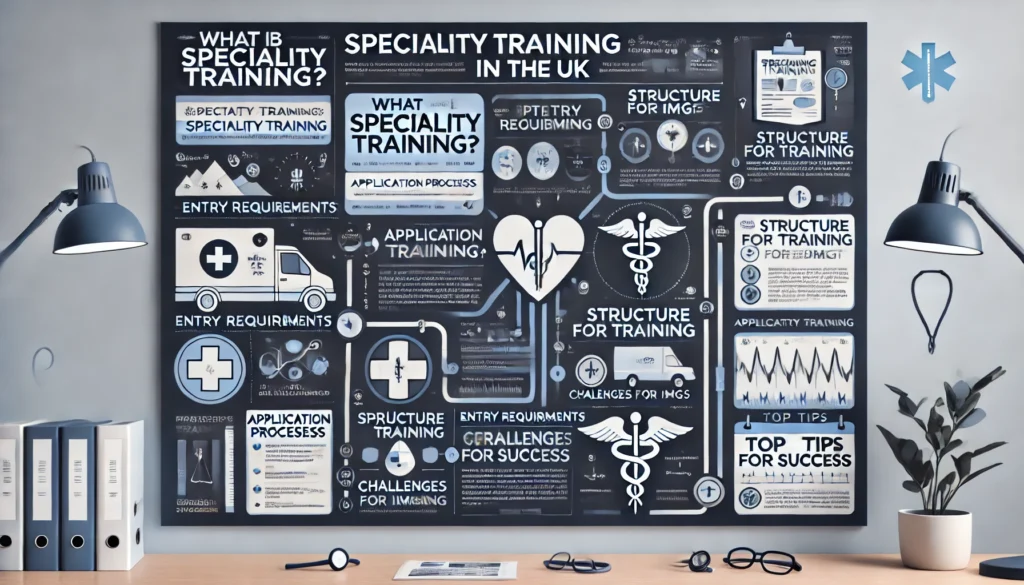Specialty education within the UK is a structured path developed to train medical professionals to be experts in their areas. This path is challenging as well as rewarding. It provides international medical graduates (IMGs) and UK graduates together with the opportunity for career advancement and professional development. Knowing the procedure as well as the requirements and structure is crucial for anyone aiming for a position as a consultant within the NHS.
What is Specialty Training?
Specialist training is the postgraduate educational pathway that provides doctors with the abilities and experience required to perform independently in a particular area of surgery or medicine. It combines theoretic learning, practical experiences, and rigorous tests.
What are thr key Features of Specialty Training:
- Range: The training duration ranges between 3 and 8 years, based upon the specific speciality.
- Training Levels: Includes Core Training and Specialty Training (CT and ST).
- Results: Provides a Certificate of Completion of Training (CCT) which allows doctors to become general doctors (GPs).
Pathways in Specialty Training
There are two primary pathways for specialty training in the UK:
- Run-Through Training
- Doctors are accepted into a specialty program that continues seamlessly from entry to completion.
- Examples include Specialty Training in Obstetrics and Gynaecology (O&G) and Cardiology.
- Duration: Typically 7-8 years.
- Uncoupled Training
- Training is divided into two stages:
- Core Training (CT): General Medical Training or Surgical Training (2-3 years).
- Specialty Training (ST): Advanced training in a chosen specialty (4-6 years).
- Examples include Internal Medicine Training (IMT) followed by a specialty like Gastroenterology.
Entry Requirements for Specialty Training
GMC Registration
- Essential: Doctors must hold General Medical Council (GMC) registration to practice in the UK.
- Routes to GMC Registration: Passing PLAB, obtaining a recognized postgraduate qualification (e.g., MRCP), or entering through the Medical Training Initiative (MTI).
Foundation Competencies
- Candidates must demonstrate the competencies outlined in the Foundation Training Program
- IMGs can fulfill this requirement by:
- Completing Certificate of Readiness to Enter Specialty Training (CREST) form.
- Gaining relevant NHS experience in non-training roles.
English Proficiency
- Valid IELTS or OET scores meeting GMC standards.
Portfolio and Experience
- A strong portfolio showcasing clinical audits, teaching, leadership, and quality improvement projects are vital for a competitive application.
What is the Specialty Training (ST) Application Process?
Applications for specialty training are managed through the Oriel system, the national recruitment platform. Here’s a step-by-step guide:
What is the Eligibility Check?
Before you apply, make sure you meet the entry criteria for your chosen specialty, including GMC registration, CREST form, and any specialty-specific requirements.
Application Submission
- Applications are submitted through Oriel during specified recruitment windows.
- Include your portfolio, CV, and relevant documents.
Multi-Specialty Recruitment Assessment (MSRA)
- Some specialties require candidates to take the MSRA, an aptitude test assessing clinical knowledge and situational judgment.
Interviews
Shortlisted candidates are invited for interviews, which assess clinical scenarios, communication skills, and portfolio presentation.
Offers and Ranking
Successful candidates receive offers based on their performance and preference rankings during the application process.
Structure of Specialty Training
Core Training
- Duration: 2-3 years.
- Focus: Builds foundational skills and knowledge in general medicine or surgery.
- Examples: Internal Medicine Training (IMT), Core Surgical Training (CST).
Specialty Training
- Duration: 4-6 years.
- Focus: Advanced, specialty-specific training under experienced consultants.
- Examples: Cardiology, Dermatology, Pediatrics.
Assessments and Progression
- Workplace-based assessments (e.g., DOPS, CBD, Mini-CEX).
- Annual Review of Competence Progression (ARCP) ensures trainees meet training standards.
Key Specialties and Their Duration
Specialty – Duration (Years) – Training Type
General Practice (GP) – 3 – Run-through
Internal Medicine – 3 + 4-5 – Uncoupled
Surgery – 2 + 6-8 – Uncoupled
Pediatrics – 8 – Run-through
Obstetrics and Gynaecology – 7 – Run-through
Psychiatry – 6 – Run-through
Emergency Medicine – 6 – Uncoupled
What are the Challenges for IMGs during the process?
Adapting to the NHS System
- The NHS operates differently from many healthcare systems worldwide. By gaining experience in non-training jobs can ease the transition to training jobs.
Portfolio Building
- A solid portfolio is vital in securing positions as a trainer. IMGs must concentrate on auditing clinicals and teaching as well as research as well as leadership roles.
Competition for Posts
- Speciality training is competitive, particularly in fields like Cardiology and Dermatology. Gaining UK experience and excelling in assessments like the MSRA can improve your chances.
Balancing Work and Exams
- Managing responsibilities while preparing for postgraduate exams (e.g., MRCP, MRCS) can be demanding. Effective time management is crucial.
Top 5 Tips for Success in Acquiring Specialty Training
- Get started early: Start preparing your resume and gain the experience you need as soon as is possible.
- Know Your Field: Research the specifics of your field, its structure needs, prerequisites, and career opportunities.
- Network: Make sure to connect with your mentors, coworkers as well as special interest groups to receive assistance and guidance.
- Utilize Resource: You could use websites such as BMJ Careers and Royal College websites to stay informed about new opportunities and news.
- Be organized: Keep an eye on deadlines, paperwork, and the specifications for each step of the procedure.
Frequently Asked Questions:
Can IMGs Apply Directly for Specialty Training?
No, IMGs must complete core training or demonstrate equivalent competencies (via the CREST form) to enter specialty training.
What is the Role of the Royal Colleges?
Royal Colleges oversee specialty training programs, set curricula, and conduct exams like MRCP and MRCS.
Can I Switch Specialties During Training?
Switching specialties is possible but requires meeting the eligibility criteria and applying through the standard recruitment process.
Is UK Experience Necessary?
While not mandatory, NHS experience strengthens your application and helps you adapt to the UK healthcare system.
The specialization training offered in the UK provides a well-organized and enjoyable path for medical professionals to pursue the level of expertise consultants require. For IMGs, the process could be difficult. However, with the right preparation, determination and determination, you can achieve success. Through establishing a solid portfolio, having relevant experiences as well as acing assessments there are opportunities for advancement and success within healthcare in the UK medical system.










